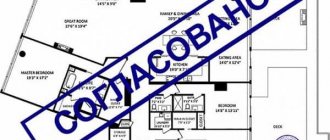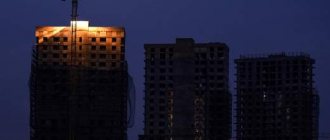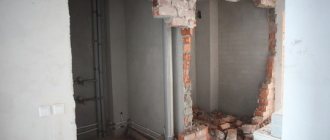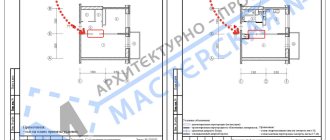Purchasing any apartment on the secondary market carries the risk of receiving housing with unauthorized redevelopment. In the best case, the seller will initially notify the buyer about this, then there will be no surprise. But it also happens that inaccuracies in the plan and in the passports are clarified after the conclusion of the transaction.
- When can redevelopment be legalized?
- What is illegal redevelopment?
- Illegal redevelopment in a mortgaged apartment
- Fine for illegal redevelopment?
- How to detect illegal redevelopment?
- What damage does the owner of an apartment with illegal redevelopment bear?
Realtors and builders divide all redevelopments into minor and significant , as well as into acceptable and unacceptable . Major and minor redevelopments can be legalized at any time, or simply abandoned and the living space returned to its original state. The most difficult case is when it is impossible to return it back and at the same time it is also impossible to legitimize the alteration. Illegal redevelopment threatens the buyer with big troubles in the future.
When can redevelopment be legalized?
The temptation to redo something in the layout of an apartment is always great. Fortunately, today there are all the possibilities for this; it is enough to hire a team of craftsmen and any work will be done quickly and efficiently. Few people think that the result should be reflected in the documents for housing. It is possible to carry out a purchase and sale transaction on the condition that the buyer, at his own expense, corrects the documents and legalizes the alteration within up to 6 months.
Failure to notify the buyer that there are redevelopments in the apartment that have not been properly approved is a valid reason for unilateral termination of the purchase and sale agreement and invalidation of the transaction.
The approval process involves submitting documents to the housing inspectorate. All you need to collect and submit:
- A new apartment plan, order it from the BTI or another organization;
- Statement;
- A copy of the apartment owner's passport;
- Copies of the purchase and sale agreement for the apartment;
- Registration certificate for the apartment;
- Written consent from each of the other apartment owners.
Depending on the specific locality, the approval process can take on average from 2 to 6 months, but on the government services portal you can submit all documents electronically and receive the necessary approval within 20 to 45 days. There will be no difficulties if the changes comply with building codes and regulations.
Why do you need a permit?
Significant modifications cannot be made without the consent of the relevant authorities for such actions. A technical opinion from appraisers will be needed to draw up a project based on it. The costs of specialist services will be reduced if a standard form of redevelopment is used.
Permission is issued in writing. The consent of the remaining owners of the apartment is notarized when the housing is shared. The bank will allow redevelopment if several conditions are met. The main criterion is mention of the possibility of changing the project in the loan agreement. The minimum duration of the agreement should not be less than six months.
The applicant often receives consent for redevelopment free of charge, but small credit institutions may charge a fee for providing the service. It is also important how conscientiously the borrower fulfills his obligations, namely, does not miss monthly payments and makes payments in accordance with the target date.
If the bank imposes restrictions on work and registration procedures, ignoring the requirements will lead to fines.
What is illegal redevelopment?
Not every redevelopment can be legalized.
For example, when it comes to demolishing load-bearing walls, moving a bathroom to another place, or other changes in the design parameters of an apartment, such redevelopment cannot be legitimized in advance and cannot be retroactively. Redevelopment should not be confused with reconstruction. For example, replacing cast iron radiators with aluminum ones, or replacing a water heater from 30 liters to 50 is a redevelopment, but making a door in the partition between adjacent rooms is a redevelopment. The redevelopment does not need to be documented, and even the most minor redevelopment automatically requires it to be included in the documents for the apartment .
According to the Housing Code of the Russian Federation, redevelopment should be carried out only after the owner of the apartment has issued all the necessary permits, and only then a special commission conducts an inspection and certifies that the repair work carried out exactly as agreed on. The presence of alterations that were not previously agreed upon puts the owner in the position of having to carry out approvals retroactively, which is not always possible.
What can change the apartment plan?
The following works are considered changes:
- moving interior partitions or adding new walls;
- shifting doorways or adding new doors;
- changing the area of the entire apartment as a result of adding balconies or loggias.
There are a number of changes that are made to the utilities of the house, for example, such as:
- replacing heating radiators and installing them on another wall;
- reconstruction of the air ventilation system;
- transfer of wet spots;
- changing the purpose of premises in the apartment.
Such transformations are not considered redevelopment. They must be carried out in compliance with the stipulated sanitary and epidemiological standards (SanPiNov).
Any of the above changes may disrupt the structure of the house, so their approval and permission are required. Local governments deal with these issues.
Until January 2021, a technical passport was a mandatory document for purchase and sale. Currently, it has been replaced by a cadastral passport, which does not contain a plan (drawing) of the apartment.
Real estate transactions have become easier, and the risk of buying an apartment with redevelopment has become more frequent.
Illegal redevelopment in a mortgaged apartment
The biggest troubles await buyers who are ready to make a purchase with a mortgage. In this case, documents for the selected square meters are submitted to the bank for approval. If after registration of the mortgage it becomes clear that there are unapproved redevelopments in the apartment, then the agreement with the bank may be in danger of being terminated .
It's all about the liquidity of such real estate. The bank is not interested in registering illegal alterations at its own expense and incurring losses. Mortgage loans are much more readily issued on the security of purchased real estate with an impeccable package of documents. That is why, by agreeing to purchase an apartment with unapproved modifications to the mortgage, the buyer is at great risk.
Does redevelopment affect the price?
The changes made to the apartment themselves are usually perceived positively by buyers. But if they are not legalized, this may affect the price of the apartment. Bargaining is possible if a global redevelopment has been carried out in the apartment, or serious interference has occurred in the structure, which will require significant costs for approval. The price of such an apartment is reduced by 1.5–2 thousand rubles per square meter.
In addition, redevelopment affects the estimated value of the apartment, which is determined for the bank by appraisers. When conducting an assessment, the amount that the buyer will need to spend on legalizing the redevelopment is deducted from the price of the apartment. If an apartment costs 2.5 million rubles, then the appraiser’s report will show 2.48 million. 20 thousand will be the cost of processing the redevelopment.
How much will the fine for illegal redevelopment cost?
It should be immediately clarified that for illegal redevelopment, the owner of the apartment can be punished due to administrative liability with a fine, but only if no one - the residents of this apartment or neighbors - suffered from the consequences of this redevelopment.
Otherwise, depending on the severity of the consequences, more serious liability may arise, including criminal liability. The fine for illegal redevelopment within the framework of administrative liability without causing damage to third parties is equal to:
- For citizens - 2-2.5 thousand rubles;
- For officials - 4-5 thousand rubles;
- For legal entities - 40-50 thousand rubles.
If damage is caused to the property interests or health of third parties, the fines will be more serious:
- For citizens - up to 5 thousand rubles;
- For officials - up to 50 thousand rubles;
- For legal entities - up to 300 thousand rubles.
If the damage is serious, and the victims can prove that the apartment owner’s actions were intentional, then they won’t be able to get away with a fine alone, not to mention the fact that full compensation for damage will have to be paid in any case.
Buyer's risks
By purchasing a living space with illegal redevelopment, the buyer risks, first of all, his wallet.
Since, according to Part 3 of Art. 29 of the Housing Code of the Russian Federation, the new owner assumes obligations to bring the living space to its previous condition, if so decided by the approval bodies, he will bear administrative responsibility for their failure to fulfill them. In this case, individuals pay a fine of 2-2.5 thousand rubles (Part 2 of Article 7.21 of the Code of Administrative Offenses of the Russian Federation). As a last resort, the owner may be deprived of square meters by a court decision and sell his property through auction (Article 29 of the Housing Code of the Russian Federation).
If the redevelopment cannot be restored to its original form and legalized, it will be necessary to prove in court that the changes do not threaten life and do not affect the interests of third parties. All costs associated with removing the restriction are borne by the buyer. The cost of obtaining a new technical passport is from 10 thousand rubles.
It is worth considering the costs of construction activities, legal advice, etc.
How to detect illegal redevelopment?
Many people do not worry about the fact that the documents for the apartment are not perfect, believing that no one cares about this. In fact, the risk of identifying illegal redevelopment always exists. Typically detection occurs as follows:
- During the redevelopment process, changes in the characteristics of adjacent structures may occur. For example, the sound permeability of the wall adjacent to the neighbors will increase, or the ventilation will deteriorate, or in some other way the neighbors will be able to assume that redevelopment has occurred in the neighboring apartment and file a complaint with the housing inspector. Upon receipt of an application to the apartment, a commission will be sent that will check the apartment plan with its actual condition, and if discrepancies are found, issue a fine and issue an order to eliminate the inconsistencies in the documents within up to 6 months or restore the apartment to its original condition.
- Due to gross violations of building codes and regulations, an accident will occur, or a failure in the work of public communications will occur, which will require the intervention of utility services, and then the previous scenario will be completely repeated, with the difference that the amount of the fine will be greater, the alteration itself may not be able to be eliminated , as well as to agree.
- During the reconciliation of meter readings, redevelopment can be detected by a utility worker, after which an application will be submitted on behalf of the utility service to the housing inspectorate.
How to legitimize the existing alteration?
If an illegal change in the layout of an apartment has been made, where should I go when purchasing?
If you nevertheless decide to buy a home with an unauthorized changed layout, then agree with the seller on two scenarios:
- The seller reduces the price by 10-15%, and you yourself legitimize the alteration he made. According to the law, this can be done even after changes have been made (Article 29 of the LC). Reducing the price in this case is a prerequisite, since it will be necessary to spend significant funds on the preparation of all documents.
- The seller independently carries out the legalization process, and only after he receives the necessary papers do you complete the transaction. With this option, your move to a new property will be delayed by 30-45 days, since it is during this time that the registration procedure is carried out.
Disadvantages of purchasing housing with illegal redevelopment
- Drawing up documents to change the technical plan falls on the current owner of the property. This is the main disadvantage of buying housing with illegal transformations. Before purchasing, you need to carefully study the list of changes in order to understand what documents you will have to fill out.
- If a threat to the safety of the home is identified, full responsibility also lies with the current owner . If it turns out that the redevelopment is dangerous for the condition of the house, then the current owner may be subject to large fines and the requirement to restore the previous appearance.
- Additional costs to obtain the necessary documentation. Some documents will be quite difficult to obtain, so be prepared for the fact that it can take a lot of time and money.
- The risk that the changes made will be unreliable and there will be a threat of housing destruction .
Is it worth taking?
What are the risks when purchasing housing with a changed and unauthorized layout? Is it dangerous to make such a purchase with a mortgage?
When deciding to purchase such an apartment, first of all study the documents and check the compliance of the floor plan with the actual organization of the space inside.
In addition, the seller must show a package of documents that reflects the legalization of all changes made, which includes:
- new layout project;
- conclusions of Rospotrebnadzor, Ministry of Emergency Situations, Fire Supervision, etc.;
- permission from the Housing Inspectorate;
- act of commissioning a real estate property.
If the seller has all these papers in stock, you can be calm and confidently complete the transaction.
At the same time, there are types of reconstruction, the approval of which is not required by law . These include the following types of changes:
- Elimination of built-in wardrobes and installation of niches in their place.
- Glazing of loggias and balconies, if they do not have radiators.
- Moving gas stoves or plumbing equipment within the same room.
- Consolidation of a bathroom by demolishing internal partitions.
These types of changes are considered insignificant since the layout of the housing does not change after them.
If a partition is demolished between two living rooms, this must be agreed upon and reflected in the floor plan.
Advantages of purchasing housing with illegal redevelopment
- Sellers usually reduce the price of a property if it has undergone unauthorized redevelopment. This is a definite advantage when purchasing a new living space, but you must always take into account subsequent problems with documentation.
- The buyer receives improved housing . This is also a big plus, since changes to standard plans are usually aimed at improving the characteristics of the living space.
- There is no need to analyze load-bearing structures , since this has already been done before the redevelopment itself. This procedure can be long and costly, and when purchasing an already remodeled home, it can be avoided.
- The redevelopment has already been done , and there is no need to hire specialists to draw up the project and directly for the work itself.
What to pay attention to
The most important document on the basis of which one can draw conclusions about the presence of uncoordinated redevelopment in an apartment on the secondary market, as well as analyze the possibility of coordinating redevelopment in a new building, is the BTI plan (in a technical passport or on a floor plan with an explanation to it ).
This document is fundamental both for analyzing the possibility of agreeing on redevelopment, and for approval as such.
Checking the layout in the BTI documentation and its compliance with the actual condition of the apartment is relevant when purchasing any real estate.
The accuracy of documents prepared by the Moscow BTI can be checked on the official website of the organization. A similar service currently exists for documents developed by the BTI of the Moscow Region.
Sources
- https://rosreestr.net/info/pereplanirovka-kvartiry-ndash-problema-dlya-prodaji
- https://zhivem.pro/kvartira/pereplanirovka/prodazha.html
- https://law03.ru/finance/article/riski-pri-pokupke-kvartiry-s-nezakonnoj-pereplanirovkoj
- https://Yur01.com/zhilishhnoe-pravo/pokupka-kvartiry/pokupka-kvartiry-s-neuzakonennoj-perplanirovkoj
- https://sdelka.guru/pereplanirovka/kvartira-s-pereplanirovkoj-v-ipoteku.html
- https://pravo.guru/gilishnoe-pr/nedvigimost/kvartira/pereplanirovka/pri-pokupke.html
- https://gsps.ru/otvety/chto-delat-esli-kupili-kvartiru-s-nezakonnoy-pereplanirovkoy.php











